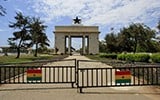The 'profession' of street hawking is alive and well in Ghana.
Living in Ghana guide for expats
All the information you need to relocate and live in Ghana.
Our selection of articles for expatriation in Ghana
The Accra I met more than a decade ago, on my arrival in Ghana was a crowded, hot humid yet dusty hive of activity. For the ...
About Ghana
Some people lovingly label Ghana as 'Africa for beginners' thanks to its easy transport connections and affable citizens. The country is particularly enjoyable from November to March, which is the dry season.
Ghana's beauty lies in its harmonious diversity ' from its varying geography (it boasts the world's largest artificial lake, national parks, and coastal forts in vibrant cities), to its different religions and cultural practices. Almost three-quarters of the Ghanaian population are of a Christian denomination, and Islam is the second most practised religion in the country. However, traditional African religions also continue to have a significant influence. Most of its population of over 28 million speak English, as this is the official language that dominates education, politics, and business. However, more than 250 languages and dialects are spoken across the 238,533km² country, although the population is concentrated in the southern half, near the Atlantic coast.
Until 2013, the country was hailed as a model for African growth. However, in the past few years, its economy has endured high inflation and a weakening currency, due to loose fiscal policy and a growing public deficit, and it has needed to seek a multi-million dollar extended credit facility from the IMF.
As a country that enjoys media freedom and democracy, Ghanaians tend to show an avid interest in politics, and in 2014 thousand went on the streets to protest against the former government's alleged mishandling of the economy. Priorities for the new administration now include stimulating economic growth, and fast-paced development can be seen in spite of the country's faltering economic performance.
Ghana is well-endowed with natural resources, and the agricultural sector accounts for approximately 20% of the GDP and provides employment for about half of the country's workforce. Cocoa, gold, and more recently oil (one of Africa's biggest oil fields was discovered off Ghana in 2007), are particularly helping to fuel the economy. In 2010, offshore oil production began in the country, which boosted economic growth, but the fall in oil prices since 2015 has cut Ghana's oil revenue by about half. However, prospects for new oil and gas production, as well as potentially higher global gold prices and tighter fiscal management, are likely to help Ghana's economy and create more opportunities for expatriates.
The economy of the country is market-based and, compared to other countries in the region, it has relatively few policy barriers to trade and investment ' making it an appealing country in Africa for foreign investors and expat professionals.
Latest housing offers in Ghana
Latest job offers in Ghana










